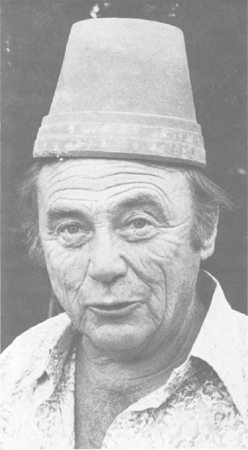Bzzlletin. Jaargang 7
(1978-1979)– [tijdschrift] Bzzlletin–
[pagina 25]
| |
Bert schierbeek The hunters appetite for victim bait & trap
| |
[pagina 26]
| |
and trap become one in principle, or rather appetite. The desire of language to become the language of desire. Before the writer can use words he must first free them from the bondage of not only the alphabet, but also the lexicon. Rhythm as syntax snatches the words from the silence of conveyance, resusitates them with the music of expression, and releases them as meaning to the unsuspecting audience.
As a guide Schierbeek admits a debt to the zen approach, but emphasises that the starting - point must not be confused with the journey. It doesn't determine the trip but rather provides a passport. The writer must become not so much an extraterrestial seer but rather an international citizen, whose preoccupations are the status of - the empty hand in the eye of a child
that no one ever saw MATTER
the way Maureen Gardner gave birth to her baby
how a glamour girls heart keeps a clean houseGa naar eind7
The score he composes, the route he maps out is ‘always an arrangement into which more reality can be packed’.Ga naar eind8 The economy of the voyage matches the notation. Thus Mondriaans preoccupations with jazz, Williams jaggedness and Valérys poetic universe of impractibility find a certain unity in Schierbeeks work. His conception holds together on the premise that this is indeed one world (poi, poi), a world everyone speaks-in (ujamo?), structuring the velocity of experience. Only in such a unity is speak-in possible: ‘we have the same fathers / we have the same mothers’Ga naar eind9
Poets and writer only borrow words from language,Ga naar eind10 sure, but they keep them till the expiry date is past and their return long overdue. They change them, re-arrange them, add to and subtract from, ‘now minus and just here perhaps - plus’Ga naar eind11. Potentialise language by intersecting the syntax - and open the door to meaning. But.
But sometimes they may get stuck. They may never run out, although we fear they may, but get stuck they do. Schierbeeks later work seems to have reached just such an equivocal position. There seems to be a spatial problem with the page and its validity and a fear, perhaps, that he has exhausted his sources and its time to return some of the words to the lexicon - One detects a shift away from the exuberance that characterised his earlier work, towards a hiatus, as if Schierbeek is catching his breath. This stuckness is itself a return to the zen starting-point, whilst the economy is represented in the form his poetry has taken - haiku, and zen exercises of inhalation and exhalation as the titels indicate (‘The Way In and Out’, Running and Standing Still, ‘Falling and Standing Up’).
It's as if Bert has created so much space, the air itself has become rare.
(De citaten zijn van de Engelse vertalingen van Charles McGeehan: Shapes of the Voice, Twayne, 1977)  |

